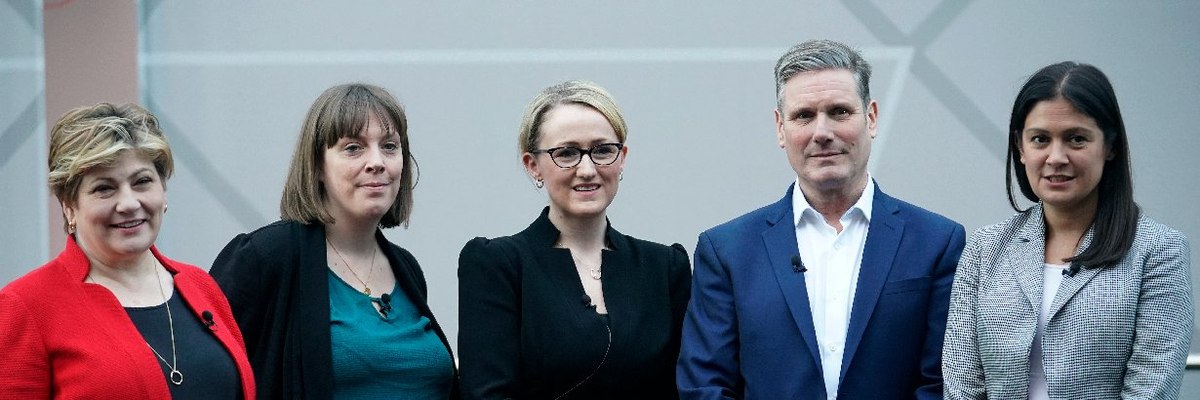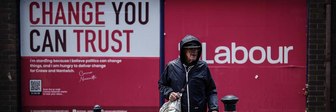It seems that members aren’t ideologically inflexible when it comes to the pursuit of power
At the same time as our recent Labour member survey which looked at the leadership horse race, we also took the opportunity to examine further parts of the membership’s mindset. Here are five further things we discovered.
1. Labour members are willing to compromise in order to win power
A consistent criticism Labour veterans had of the party during the Corbyn era is that it was more interested in occupying an ideologically-pure comfort zone than it was pursuing power.
In order to get elected, the saying goes, one must compromise with the electorate. So how far are Labour members willing to go?
Only 14% of Labour members say they are completely unwilling to compromise any Labour values, even if doing so would mean the party were unelectable (although this view is held by 32% of Rebecca Long-Bailey supporters).
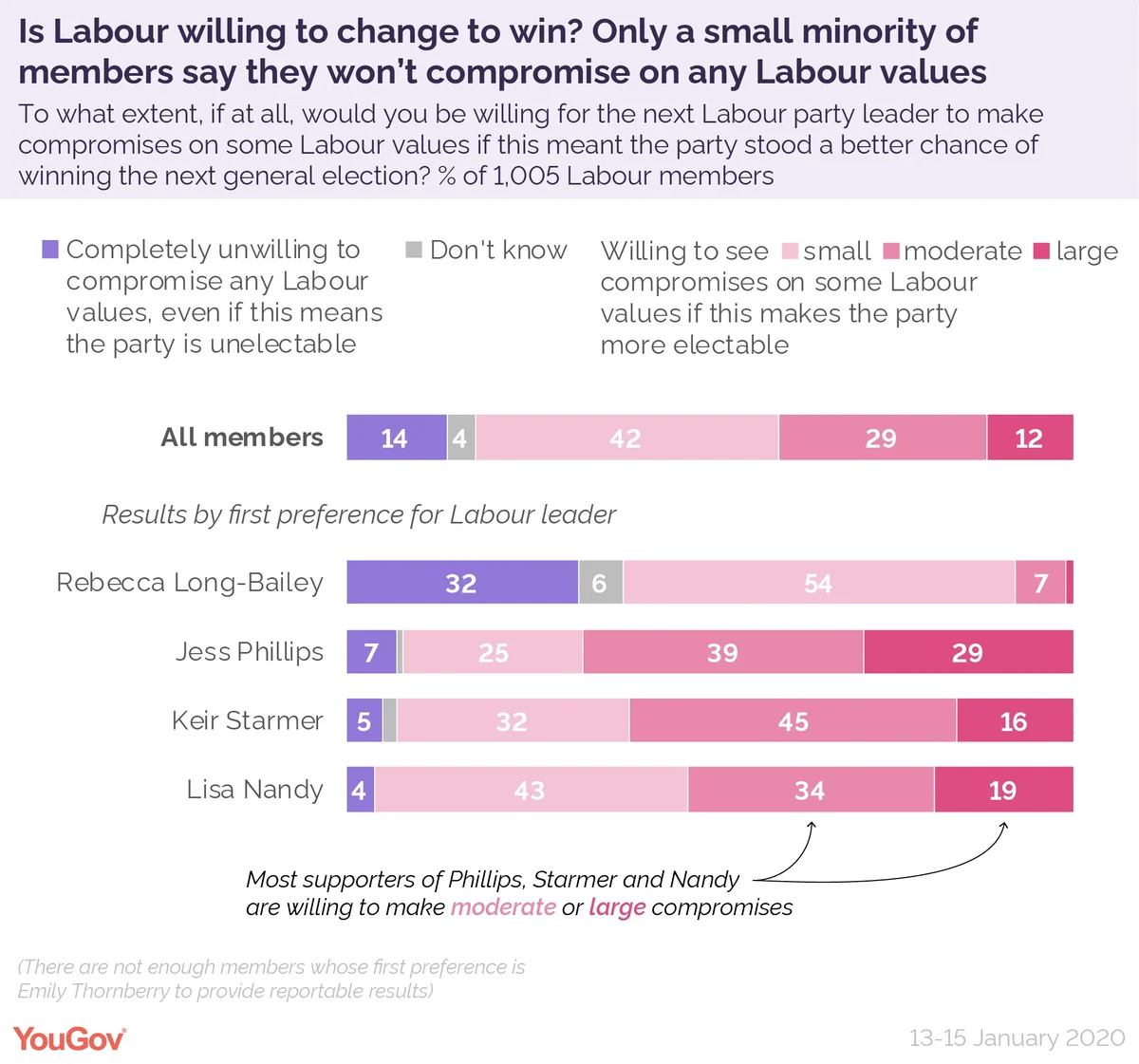
The largest body of members (42%) is willing to make small compromises on some Labour values in order to make the party more electable. A further 29% would accept making moderate compromises and 12% would concede large compromises.
Those members whose first preference for leader is Jess Phillips are the most likely to be willing to make moderate to large compromises, at 68%.
2. Jeremy Corbyn is favourite among former leaders
Jeremy Corbyn is the membership’s most fondly remembered leader, with 71% saying they hold a favourable view of him. He is only barely ahead of his predecessor Ed Miliband, whom 70% also have favourable feelings of.
Shortly behind them on 67% is Labour’s Prime Minister who never was – John Smith, who died an untimely death in 1994 when the party was consistently ahead in the opinion polls.
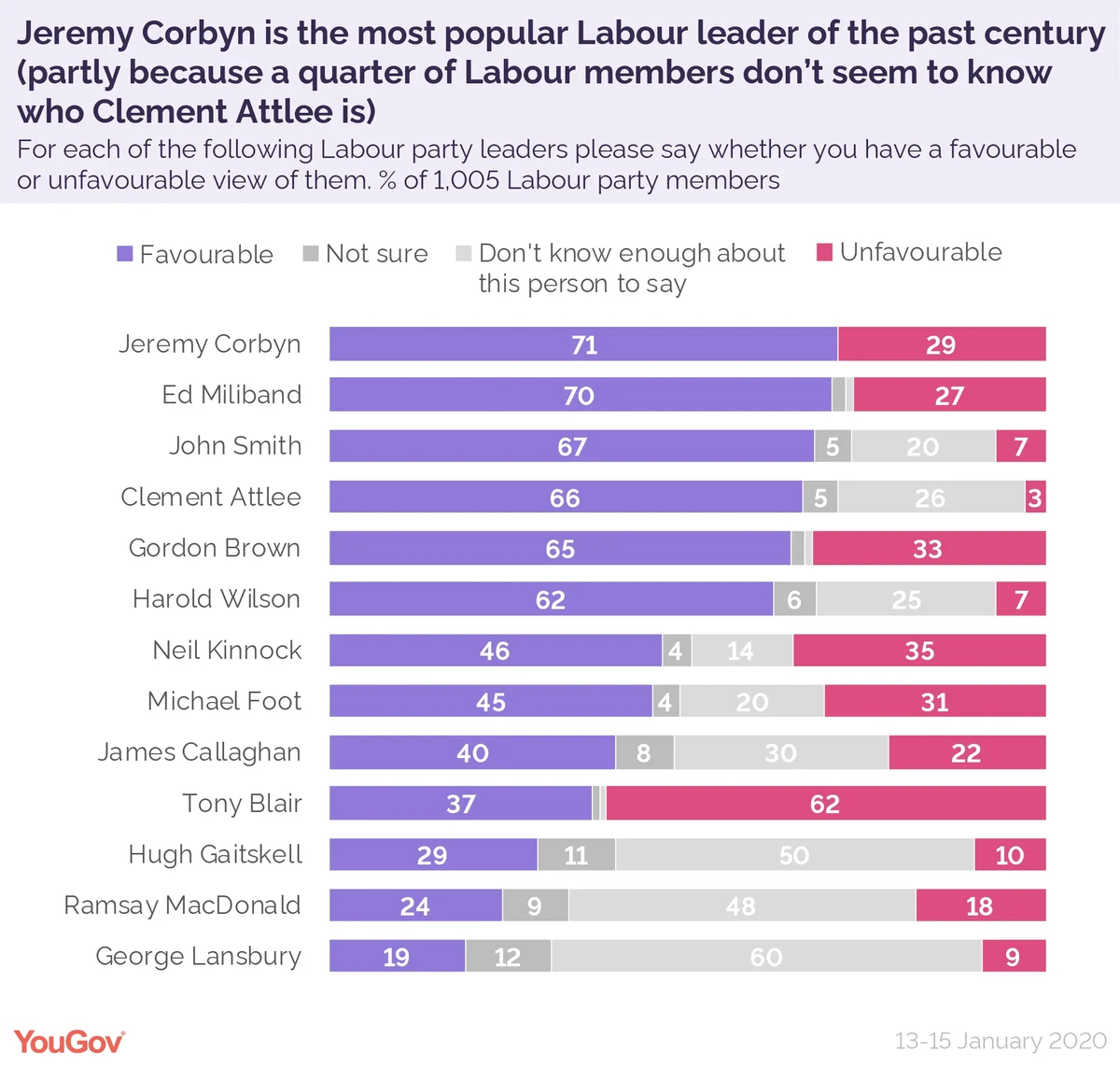
Just behind Smith is Clement Attlee, Labour’s Prime Minister from 1945 to 1951, and practically the patron saint of the party. While it is not unusual for people to be less likely to know about historical figures compared to current ones, it is perhaps surprising given Attlee’s status in the Labour party that 31% of members can’t form an opinion on the man who gave Britain the NHS and expanded the welfare state.
Two further former PMs – Gordon Brown and Harold Wilson – come next, on 65% and 62% respectively. In a sign of how deeply damaged Tony Blair’s reputation continues to be within the party, just a third (37%) of members have a favourable view of Labour’s most recent election-winner.
3. Rebecca Long-Bailey is seen as the continuity-Corbyn candidate
Rebecca Long-Bailey has long since been described as the continuity-Corbyn candidate, and the membership seems to agree: three quarters of members (76%) would describe Long-Bailey as a ‘Corbynite’.
No other candidate is seen as a disciple of the current leader – only 12% say the same of Emily Thornberry and just 4% to 5% do so for Phillips, Nandy and Starmer.
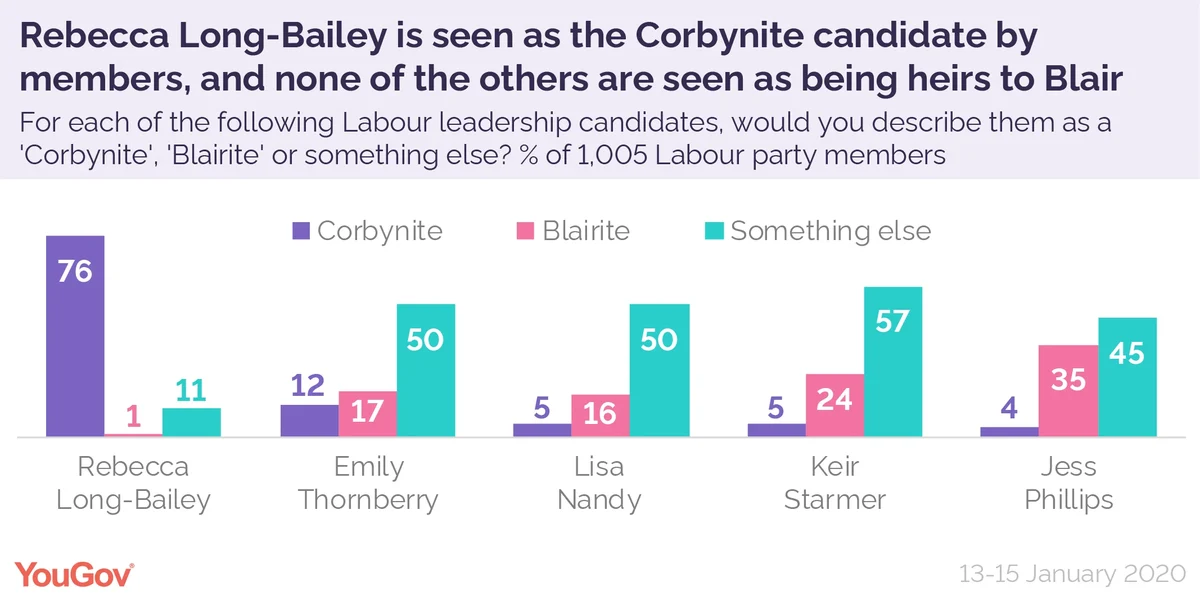
In Labour party nomenclature the opposite of a ‘Corbynite’ might well be a ‘Blairite’, still often used as a term of abuse among a certain type of Labour supporter.
Jess Phillips is seen as the biggest Blairite on the board, but at only 35% it is clear that none of the candidates could be described as an ‘heir to Blair’. With the exception of Long-Bailey, around half (45% to 57%) see the candidates as belonging to neither strand of Labour thought.
4. Party members aren’t as interested in the ‘labour’ in Labour party as they are a broader fairness agenda
The survey also asked which of three statements best reflected what members think the Labour party currently stands for and what it should stand for:
- “Getting rid of capitalism and neo-liberalism and replacing them with a fairer economic system” (Anti-capitalist party)
- “Representing and standing up for ordinary working class people and their values” (Workers’ party)
- “Building a society that is fair for everyone, whatever their background, gender, race or sexuality” (Fairness for all party)
While these are not mutually exclusive priorities – the party could indeed do all three at once – the question sought to look at what members’ emphasis is.
Despite the name of the party, few members (just 12% in both cases) chose the working class party option. In fact, the majority of members (56%) think the Labour party is currently a ‘fairness for all’ party, a figure which rises to 67% when asked what they think the party should stand for.
For both questions 20% of members said they think Labour is or should first and foremost be an anti-capitalism party.
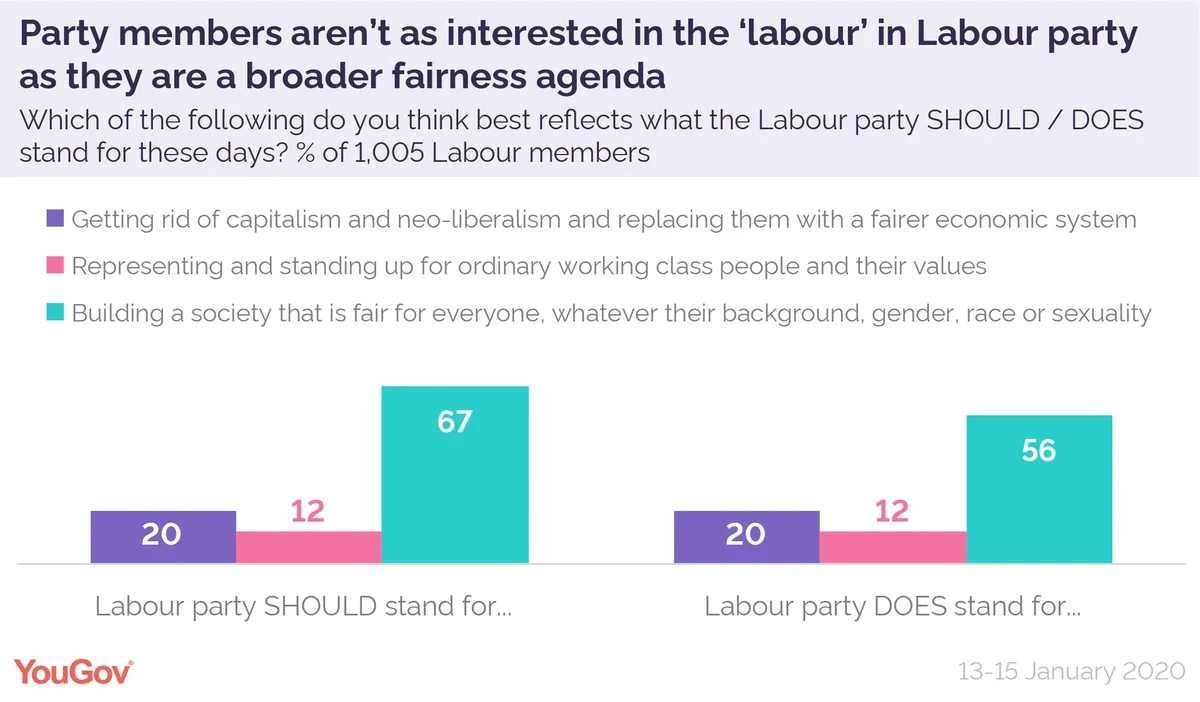
5. Momentum is divisive within the party
While Momentum and the Labour party seemed indistinguishable during the early days of Corbyn leadership, the reputation of the activist group now splits the party. While 46% of members have a favourable view of Momentum, they are almost equally offset by the 42% who have an unfavourable one.
The more traditionally Labour-connected entities – the trade unions – are the most well-liked on the list of bodies we asked about: 75% have a favourable view of UNISON, while 65% look warmly upon Unite.
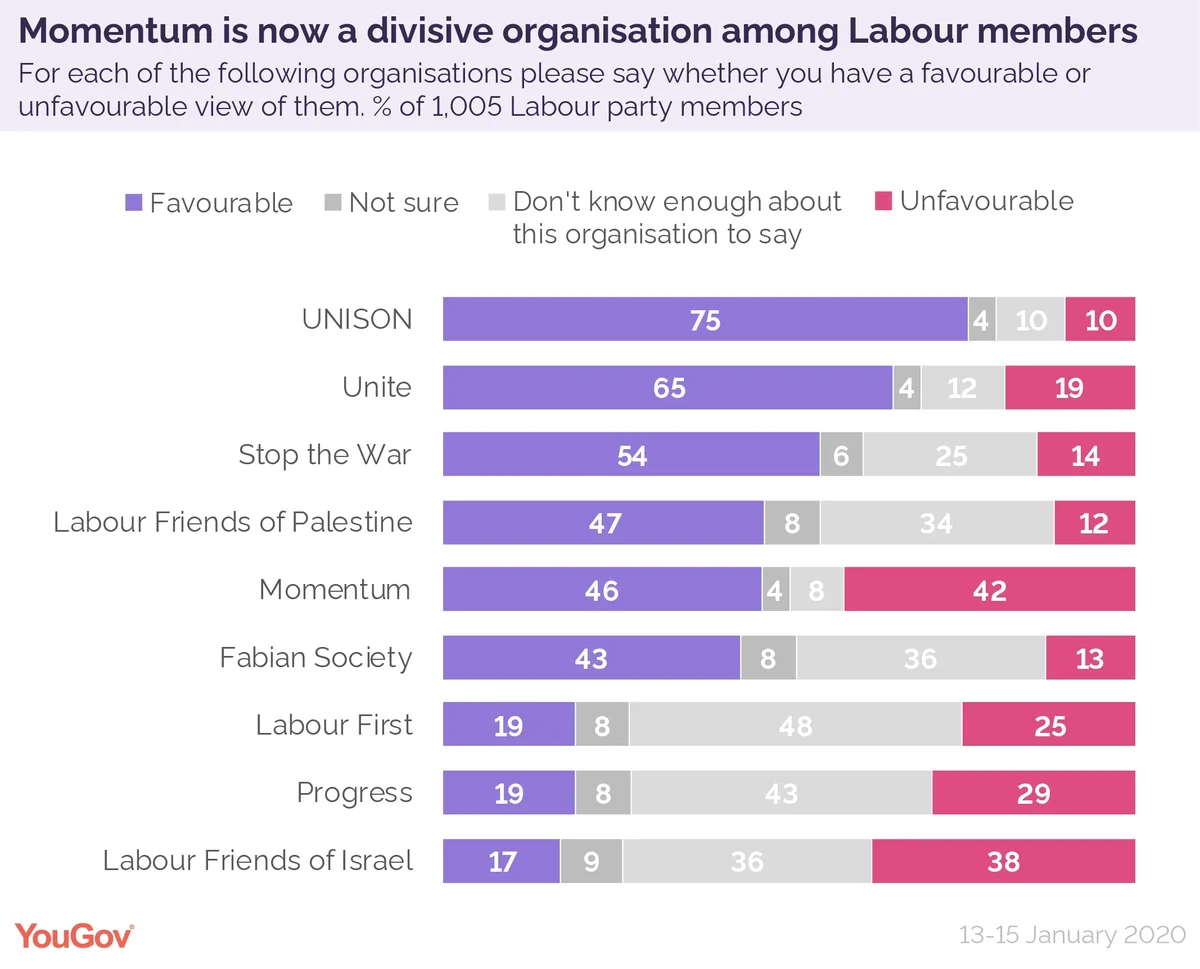
Many Labour members are passionate about the status of Palestine, to the extent that recent party conferences have featured a sea of members waving Palestinian flags. That being the case it is not surprising to see 47% of members have a positive view of Labour Friends of Palestine. At the same time only 17% of members have a positive view of Labour Friends of Israel.
Photo: Getty
